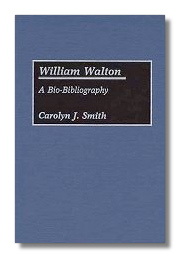Site Search
Follow us on


Affiliates
Books About Music
Biographies

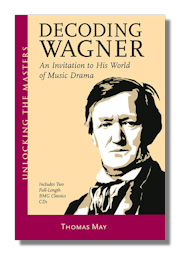
-
Decoding Wagner: An Invitation to His World of Music Drama. Thomas Robert May. Amadeus Press. 2004. ISBN 1574670972 (paperback).
-
The cultural controversies he helped to create have long since died down, but Richard Wagner still remains a polarizing icon. Just as he dreamed of combining the arts, his influence extends well beyond the field of classical music to theater, literature, painting, and more. Wagner represents a phenomenon which is hard to ignore. His compulsive need to document his thoughts – apart from his art – finds an echo in the enormous body of explanation Wagner has inspired. Yet even with so much written about him, Wagner continues to be a deeply misunderstood figure. This guide aims to unlock the world of Richard Wagner and his works, his monumental achievements, and, ultimately, the great emotional power inherent in his art. This emotional power is double-edged, often serving as a kind of mirror for what each listener brings to it. The book challenges the assumptions and stereotypes of the "Wagnerian" idea of art. Decoding Wagner presents a straightforward, fresh overview of what Wagner attempted to achieve with his "artwork of the future." Lively discussions of his major works place them in the context of his life and consider the interplay of dramatic and musical elements with philosophical ideas which are so unique to Wagner. Two accompanying full-length CDs illustrate and trace his growth as a composer. Decoding Wagner appraises the enormously expressive richness that continues to make his art compelling and relevant for contemporary audiences.
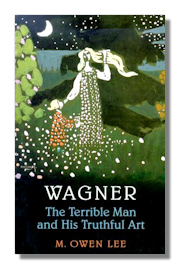
-
Wagner: The Terrible Man and His Truthful Art. M. Owen Lee. University of Toronto Press. 1988. ISBN 0802082912 (paperback).
-
How is it possible for a seriously flawed human being to produce art that is good, true, and beautiful? Why is the art of Richard Wagner, a very imperfect man, important and even indispensable to us? In this volume, Father Owen Lee ventures an answer to those questions by way of a figure in Sophocles – the hero Philoctetes. Gifted by his god with a bow that would always shoot true to the mark and indispensable to his fellow Greeks, he was marked by the same god with an odious wound that made him hateful and hated. Sophocles' powerful insight is that those blessed by the gods and indispensable to men are visited as well with great vulnerability and suffering. This book traces some of Wagner's extraordinary influence for good and ill on a century of art and politics – on Eliot and Proust as well as on Adolf Hitler – and discusses in detail Wagner's Tannhäuser, the work in which the composer first dramatised the Faustian struggle of a creative artist in whom "two souls dwell." In the course of this penetrating study, Father Lee argues that Wagner's ambivalent art is indispensable to us, life-enhancing and ultimately healing.
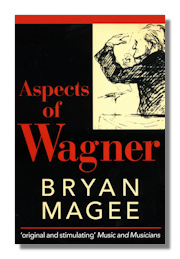
-
Aspects of Wagner. Bryan Magee. Oxford University Press. 1988. ISBN 0192840126 (paperback).
-
Many music lovers find Wagner's operas inexpressibly beautiful and richly satisfying, while others find them revolting, dangerous, self-indulgent, and immoral. The man who W.H. Auden once called "perhaps the greatest genius that ever lived" has inspired both greater adulation and greater loathing than any other composer. Bryan Magee presents a penetrating analysis of Wagner's work, concentrating on how his sensational and deeply erotic music uniquely expresses the repressed and highly charged contents of the psyche. He examines not only Wagner's music and detailed stage directions but also the prose works in which he formulated his ideas, as well as shedding new light on his anti-semitism and the way in which the Nazis twisted his theories to suit their own purposes. Outlining the astonishing range and depth of Wagner's influence on our culture, Magee reveals how profoundly he continues to shock and inspire musicians, poets, novelists, painters, philosophers, and politicians today.
-
Richard Wagner the Man, His Mind and His Music. Robert W. Gutman. Harcourt Brace. 1990. ISBN 0156776154 (paperback).
-
From the great to the gross, all is revealed in this frank biography.
-
The New Grove Wagner. John Deathridge, Carl Dahlhaus. W.W. Norton & Company. 1997. ISBN 0393315908 (paperback).
-
-
William Walton - A Bio-Bibliography. Carolyn J. Smith. Greenwood Publishing. 1988. ISBN 0313253919 (hardcover).
-
This bio-bibliography of one the most important contemporary British composers begins with a brief biographical sketch. Works and first performances are listed alphabetically by title, and each entry is followed by the relevant bibliographic citation numbers. The discography includes sound recordings in all formats. The major portion of the work, the bibliography, is divided into articles and reviews; books, theses, and dissertations; articles by Walton; and films. The archival section lists collections of Walton's music manuscripts, letters, and miscellanea. Two appendices contain a chronological listing of works and first performances, and a works lists arranged by classification.
-
Portrait of Walton. Michael Kennedy. Oxford University Press. 2000. ISBN 0198167059 (paperback).
-
In this biography by one of England's foremost writers on music, William Walton's personality emerges in all its complexity and self-contradiction. Michael Kennedy portrays a creative artist completely committed to his art yet plagued by misgiving and doubts, prey to insecurity and frustration, vulnerable to criticism, and jealous of the achievement of others. At the same time he was witty and generous, bore no grudges, and enjoyed the loyalty of a host of friends. Appointed his biographer by the composer himself, Kennedy has had access to correspondence with many of the friends and colleagues who were important in Walton's life, among them Siegfried Sassoon, Benjamin Britten, Malcolm Arnold, and André Previn.
-
The New Grove Early Romantic Masters, II. John Warrack, Hugh MacDonald, Karl-Heinz Kohler. W.W. Norton & Company. 1985. ISBN 039330096X (paperback).
-
Comprehensive biographical articles taken from the New Grove Dictionary of Music & Musicians. Included are: Carl Maria von Weber, Hector Berlioz, and Felix Mendelssohn.
-
Anton Von Webern. Malcolm Hayes. Phaidon Press. 1995. ISBN 0714831573 (paperback).
-
-
New Grove Second Viennesse School. Oliver Neighbour, et al. W.W. Norton & Company. 1998. ISBN 0393315878 (paperback).
-
Comprehensive biographical articles taken from the New Grove Dictionary of Music & Musicians. Included are: Alban Berg, Arnold Schoenberg, and Anton Webern.
-
Kurt Weill: A Handbook. David Drew. University of California Press. 1987. ISBN 0520058399 (hardcover).
-
-
Kurt Weill: An Illustrated Biography. Douglas Harman. Indiana University Press. 1982. ISBN (paperback).
-
-
Widor: The Life and Times of Charles-Marie Widor, 1844-1937. Andrew Thomson. Oxford University Press. 1989. ISBN 0198161867 (paperback).
-
-
Hugo Wolf. Frank Walker. Princeton University Press. 1992. ISBN 069102720X (paperback).
-
Hugo Wolf (1860-1903), who was among the greatest Romantic song composers. Frank Walker spent nearly fifteen years researching and writing this authoritative work, drawing on inter views with dozens of Wolf's friends, relatives, and fellow musicians and on the letters, diaries, and documents he uncovered to create a portrait of this head strong and fascinating man. Composer of over two hundred masterful settings of poetry by Goethe, Mrike, and others, Wolf's songs were composed during periods of intense inspiration that were followed by lengthy fallow periods. The author vividly portrays the extremes to which the composer was prone and interweaves an account of Wolf's creative triumphs with the tale of his life.
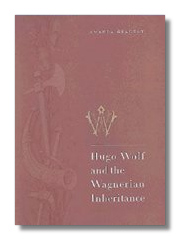
-
Hugo Wolf and the Wagnerian Inheritance. Amanda Glauert. Cambridge University Press. 1999. ISBN 0521496373 (hardcover).
-
This book offers an in-depth study of his music, including detailed analyses of selected songs. Perspectives from musical analysis and history are brought together to show how this composer and late nineteenth-century song have a far more significant role in helping us to understand Wagner's musical and aesthetic influence than has yet been realised.
-
Hugo Wolf. Susan Youens. Princeton University Press. 1992. ISBN 0691091455 (hardcover).
-
In the realm of song, Wolf is among the greatest inheritors of Schubert and Schumann, a composer who was both a traditionalist and a modernist. When the Viennese critic Eduard Hanslick disapprovingly dubbed Wolf "the Richard Wagner of the lied," he was paying oblique homage to Wolf's genius as a song composer in the most modern manner. The author examines five aspects of Wolf's compositional art, each exemplifying a different synthesis of traditionalism and modernity and spanning his entire, tragically-brief creative life, from his first efforts to his lapse into insanity in 1897. Wolf's youthful imitations of Schumann, his genius for comic songs of a kind unlike any of his predecessors, his part in the ballad revival of the late nineteenth century, Wolf in relation to his contemporaries, and his pursuit of operatic fame – in her investigation of these subjects, Youens discusses the poetic texts as closely as she does the music and includes numerous previously unpublished sketches and fragments, examples from songs now long out-of-print and difficult to obtain, and citations from Wolf's vivid letters and from other sources of the period. For lieder enthusiasts, this book has much that is new or little known to offer.



















